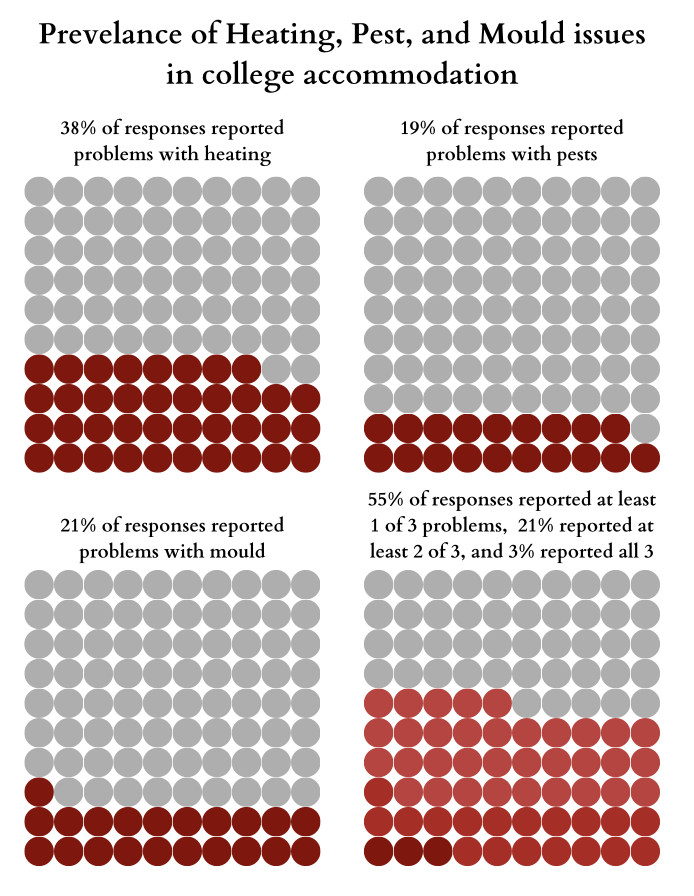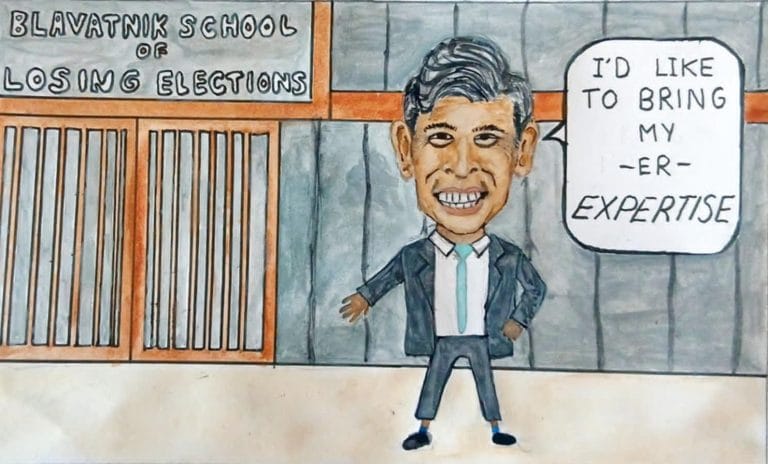Cherwell surveyed over 600 Oxford students to reveal which colleges have the worst accommodation, as well as disparities in value for money, rent prices, and student satisfaction. From faulty heating to pest infestations, the results expose systemic inequalities in Oxford’s accommodation and the reality students are left to deal with.
Oxford University students are facing serious accommodation issues, from sky-high rents to freezing rooms and persistent mould. Cherwell surveyed 650 students across 32 colleges to uncover the reality of student housing. The results expose stark disparities: while students at wealthier colleges enjoy better value for money, those at poorer colleges contend with pests, faulty heating and unresponsive administrations.
Respondents rated their overall housing, as well as their bedroom, kitchen and bathroom facilities, on a scale from 1.0 (“very unsatisfied”) to 5.0 (“very satisfied”). These scores were averaged to provide a comprehensive measure of student satisfaction, with the same approach applied to ratings of value for money. Students also had the chance to report problems with heating, mould or pests and to evaluate how well their college handled maintenance complaints, ultimately shining a light on which colleges provide the best places to live.
Student Satisfaction
Across the student body, the average rating was 3.60/5, indicating that students generally felt “neutral” to “satisfied” with their accommodation. The most satisfied students were from Somerville College and Worcester College, both of whom gave a rating of 4.14, followed by Merton College at 3.94 and Corpus Christi College at 3.93. One Merton student praised the “fantastic accommodation and maintenance team,” adding, “honestly, for the amount we’re paying, it is insane that we get such a good service.” The least satisfied students were from St Edmund Hall, which received a rating of 3.17, with Lady Margaret Hall and Pembroke College close behind at 3.18.
Bedrooms received an average score of 4.12, standing in stark contrast to the much lower rating of 2.94 for kitchen facilities. One Exeter College student described sharing a “tiny kitchen” with 115 people as “anxiety-inducing,” while a Brasenose College student described their “kitchenette,” which amounted to little more than “one mini fridge with a microwave and toaster placed on top” for eight people. Bathrooms fared slightly better, averaging a score of 3.62 across all colleges, though experiences varied widely. Mansfield College students praised the accessibility of en-suites whilst a St Anne’s College student however, told Cherwell that in their first year they shared a bathroom “smaller than an airplane toilet” with seven others.
Value for money
Students at LMH reported the lowest value for money with an average score of 2.10. Following closely were Wadham College with a score of 2.54 and St Peter’s College with 2.56. On the other end of the spectrum, students at St John’s College felt they were getting the best value with an average score of 4.21 – no surprises there since student’s from John’s reported the cheapest rent of all the colleges surveyed. Students at Balliol College and Merton also felt they were getting a good deal, with both colleges averaging a score of 4.07.
Cherwell found that the more someone is paying for their accommodation, the poorer they will rate it’s value for money. With a higher rent, one would expect more reliable heating and better protection from mould and pests. However, this is not the case. In fact the survey showed quite the opposite. As the average rent of a college increased, so did the percentage of rooms experiencing issues with heating, mould, or pests. In short, at Oxford, paying more for accommodation does not guarantee a better living experience; rather, it may mean dealing with black mould, silverfish, and cold, sleepless nights.
The most reliable indicator of value for money in college accommodation is the size of a college’s endowment. A systemic issue means that wealthier colleges can offer better-quality housing, while students at poorer colleges are left to contend with mice and mould. Figure 1 illustrates that colleges with larger endowments per student tend to have lower average rent costs and thus receive higher value-for-money ratings. The 10 colleges with the lowest endowment per student charge an average of £1,926 per term for rent, while the 10 wealthiest colleges charge £1,689 per term on average. Moreover, 57% of students from the least well-endowed colleges reported issues with heating, mould, or pests, compared with 50% from the wealthiest colleges. Overall, a strong correlation was found between higher average termly rent of a college and an increased proportion of students reporting accommodation issues.
Accommodation issues
More broadly on the topic of heating, mould and pests, respondents to the survey were asked to report any issues they had experienced in their accommodation, focusing on these three key areas. The survey found that 55% of undergraduates living in college accommodation were dealing with at least one of these issues, with figure 2 showing the prevalence of each one. LMH had the highest proportion of students reporting issues, with 90% living in affected rooms, followed by St Catherine’s College with 85% and Exeter with 72%. Notably, all three colleges rank in the bottom half for endowment per person, highlighting a potential link between funding and facility quality.

Heating
The survey showed that 38% of undergraduates were dealing with heating problems. One student from St Catherine’s told Cherwell: “In first-year accommodation, I was so cold that I couldn’t type on my laptop and was constantly sick.” The worst colleges for heating issues are LMH, with 90% of students reporting issues, St Edmund Hall at 69%, and the aforementioned St Catherine’s at 57%. The problem of insufficient, or broken, heating is not confined to these colleges. A Hertford College student described that “In the November storms the room was so cold I was turning blue and having to wear 3-4 jumpers”, and they ended up sleeping in another student’s room for a few days to escape from the cold. A student at Exeter reported that in all rooms in their college owned house “thermometers normally show 14°C”, a full 4°C below the NHS recommended temperature for a room. The environmental impact of leaving radiators running was understood by many respondents, and one student from Wadham spoke about how they “understand the need to save energy”, but then went on to say that to deal with the cold they had resorted to “turning the oven on and leaving it open”. The overarching sentiment from students was a desire for greater control over when the heating is turned on in their accommodation, as well as a suggestion that colleges consider improving the insulation of their buildings.
Pests
When it comes to pests, 19% of respondents reported encountering them in their rooms. The most common issue was mice, accounting for 29% of all reports, followed by cockroaches at 23% and silverfish at 21%. The colleges with the highest percentage of rooms affected by pest issues were LMH, with 50% of students reporting problems, followed by St Catherine’s and Pembroke, both at 42%. A student at Hertford reported that “There were cockroaches and an ant infestation in main site rooms last year, which the college admits is a regular problem and yet not one that they attempt to fix”. One student at Brasenose shared how they came back from the Christmas vacation to find bedbugs in their room. The college responded quickly and treatment was done 3 days after the issue was reported, however the bites continued for two weeks after this. This time the responses from Brasenose were not as proactive and they told the student to wait as the treatment would take a while to start working. The student asked to move rooms and was told “plainly that this would not be possible”. Having received no compensation, she told Cherwell, “the college grossly neglected their responsibility to provide me with a safe and liveable room”.
Mould
An issue that affects student houses across the country is mould, and Oxford is no exception. 21% of the respondents reported dealing with mould in their rooms. Whilst this figure dropped to 15% in the newer secondary accommodation buildings of colleges, it rose to 36% in college owned houses. The colleges that reported the highest level of mould across all undergrad rooms were Magdalen College at 50%, Worcester at 45% and Mansfield at 44%. A student living in the Linbury Building in Worcester described how last year, “every time I moved in the bathroom would be covered in black mould” and “as part of our moving in routine, my mum and I would use a mould spray and sponge to clean it all”. One student at Mansfield described their windowsill as “entirely mouldy, with the wood rotted away.” They reported the issue to the accommodation manager at the start of Michaelmas, requesting it be replaced by Hilary. However, upon returning this term, they found the mould had been painted over, while the rotting wood had not been replaced.
Reporting issues to college
Given the number of persistent issues in undergraduate accommodation, it is unsurprising that 55% of undergraduates reported having raised a problem with their college at some point. These students were then asked to evaluate their college’s response, rating its helpfulness on a scale from “very unhelpful” (1.0) to “very helpful” (4.0). Across all colleges, the average score was 2.98/4, indicating that most students regarded their college’s response as generally ‘helpful’ in addressing accommodation issues. The colleges with the lowest ratings were LMH, with a score of 2.11, St Edmund Hall at 2.17, and St Catherine’s at 2.29. It is unsurprising that the survey found a strong correlation between the perceived unhelpfulness of a college in responding to accommodation problems and the proportion of rooms that encountered issues with heating, mould, or pests. Many colleges provided stories of insufficient responses to major problems.
One student living in a St John’s owned house reported how they had no plumbing in their house for 6 weeks. The problem was reported on Tuesday 8th of October, and a contractor was brought in on Monday the 18th of November. In the weeks between they said “we were banned from using all showers and toilets in the house” and instead had to use the house next door’s facilities. Despite this all members of the house were still required to pay the full £264 facilities charge.
In a college house at Merton, one student’s room was “growing mushrooms out of the wall”, whilst another “had a constant stream of dropping water coming through the ceiling”. The mushrooms were growing from a patch of mould that the college only sought to deal with after the student had gone to the welfare team. The student living in the room with the leaky ceiling had to stay in hotel rooms on numerous occasions and was “offered no compensation”. The respondent went on to say they felt that the college is “far more concerned about their reputation […] rather than the individual students welfare”.
Conclusion
Cherwell’s survey of Oxford’s accommodation reveals a stark divide tied to college wealth. Students at colleges with smaller endowments are more likely to face persistent issues like pests, mould, and heating problems, while those at wealthier colleges enjoy significantly better living conditions. A lack of responsiveness from college administrations is another major concern, with many students feeling their complaints are ignored or dismissed. Despite higher rent prices, these problems persist, underscoring a systemic failure in Oxford’s accommodation system.
Note: While on average 23 students per college responded to the survey, not all colleges had an equal number of responses. Those colleges with significantly fewer responses are: St Peters (9), LMH (10), Magdalen (12), Wadham and St Edmund Hall (13). Any responses from colleges or halls with fewer than nine responses were excluded.
College Responses
LMH: “We continually work to address any concerns raised by our students about College accommodation.”
St Catherines: “St Catherine’s continuously strives to ensure that student accommodation meets high standards – despite challenging circumstances during the past year – and we take student concerns about accommodation seriously”
University: “University College always endeavours to respond to any cases of mould in College student accommodation when they are reported to us and undertake a fungicidal wash down as soon as we can and usually within 24 hours. Occasionally we are required to wash down and redecorate, which can take a short while to arrange. In some cases, we can instigate a more permanent solution where we are able to do a thermal line-out, although this is not always possible in the heritage properties.”
St John’s: “We are aware that the delay in resolving the plumbing issue was frustrating for students living in the building. Unfortunately the problem was more complex and could not be fixed by our internal Works team. We had to instruct a specialist contractor which took longer than we had hoped. The adjacent interconnected facilities were made available to affected students, and the College also offered to find alternative accommodation to students who wanted to move until the problem was fixed.”
Mansfield: “Mansfield takes the safety of its students and staff very seriously. We have had problems with mould in some ofour older buildings (which we are looking to replace), and have robust procedures for logging mould reports and taking remedial action to address them. Students in en-suite rooms are also given guidance on using the extraction fans provided, and ensuring good ventilation to avoid mould developing. In addition, all students are encouraged to use the free laundry facilities provided at College, so they can avoid introducing damp by not drying wet clothes in their rooms.”
Worcester: “Worcester College is committed to providing high-quality accommodation that is fit for purpose. We continually invest in our buildings and welcome feedback from students, to which we are quick to respond. Effective ventilation is vital in reducing the build-up of mould, especially in high-risk areas such as bathrooms and kitchens, and we work closely with the JCR and MCR Accommodation Reps to share best practice and remedy any issues swiftly.”
Exeter: “Exeter’s Rector is just about to contact Exeter students about these very issues (he may have done so already) as they are a priority for the college”










